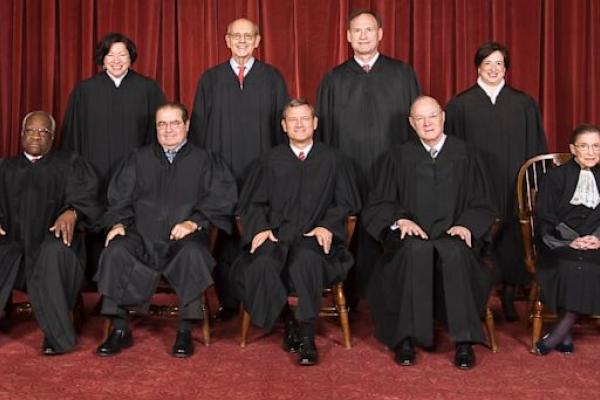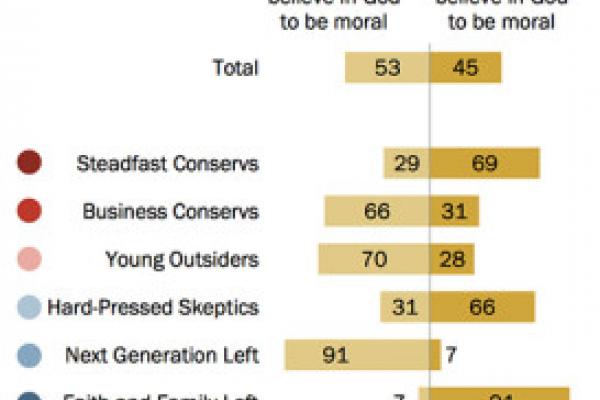The decades-long battle over a cross erected on public land in California will drag out even longer now that the Supreme Court declined Monday to hear the case.
The conflict in Mount Soledad Memorial Association v. Trunk, is over a 43-foot cross that sits atop Mount Soledad on public land in San Diego. The cross was erected in the 1950s and has since become a veterans’ memorial.
Five things to know about one of the most anticipated Supreme Court decisions of the year:
1. Corporations can’t pray, but they do have religious rights.
Hobby Lobby isn’t a person. It’s a chain of crafts stores owned by a religious family. And though the evangelical Green family objects to parts of the Affordable Care Act’s emergency contraception mandate, it’s not the Greens but the company that writes the check for employees’ health insurance. The first question the justices had to answer was this: Does Hobby Lobby have religious rights? To many Americans, this sounds a little nutty. Does a craft store believe in God?
A majority of the justices held that a closely held company such as Hobby Lobby does have religious rights. The court didn’t apply those rights, however, to publicly held corporations, where owners’ religious beliefs would be hard to discern.
But well before the justices had delivered their verdict on this question, many legal scholars said they wouldn’t be surprised were they to affirm the company’s religious rights. American corporations do have some of the rights and responsibilities we usually associate with people. And in the 2010Citizens United campaign finance case, the justices overturned bans on corporate political spending as a violation of freedom of speech — corporations’ free speech.
We’re headed home from Wild Goose Festival, a gathering of artists, activists, musicians, and theologians, in Hot Springs, N.C. It was hot, rainy, and messy. My suitcase smells like my fifth grade gym locker.
I can’t wait to go back next year.
The speakers are remarkable; many of them are walking the talk they’re offering, which is an unfortunately rare phenomenon. The music is fresh and exciting, the art is created before your eyes, and there is an energy of hopeful expectation that renews your soul, flushing out the broken-down-ness of daily life.
But the most important part of the whole four-day event lies in the unexpected moments. Sometimes I would walk along the main dirt road in the middle of the grounds, lined with tables, tents, and makeshift gathering spaces, until I saw something interesting going on and just joined in.
In one moment you’re debating the theological implications of the American food-industrial complex. Half an hour later, you’re laughing with new friends in the beer tent. And then, just when the sun sets and you’re sure you lack the fortitude to go one any more, the music on the main stage cranks up and the very earth beneath you vibrates.
It’s tempting for many Christians to put on a disguise. This is especially true of people within church leadership. Expectations need to be fulfilled, roles need to be played, and responsibilities must be carried out. This is the biggest danger of the Christian alter-ego: pretending to be someone we’re not.
The Supreme Court on Monday sided with the evangelical owners of Hobby Lobby Stores Inc., ruling 5-4 that the arts-and-crafts chain does not have to offer insurance for types of birth control that conflict with company owners’ religious beliefs.
Beyond the specifics of the Hobby Lobby case before them, the justices broke new legal ground by affirming that corporations, not just individual Americans or religious non-profits, may claim religious rights.
Does Monday’s decision mean, however, that the religious beliefs of business owners stand paramount? That they are more important than a female employee’s right to choose from the full array of birth control methods she is promised under the Affordable Care Act? Or that a business owner may invoke his religious rights to deny service to a gay couple?
Not necessarily, legal experts say.
Closely held corporations cannot be compelled to pay for contraception coverage, the Supreme Court ruled Monday in its highly anticipated Burwell v. Hobby Lobby Stores case. The "contraceptive mandate" in the federal health care law was challenged under the Religious Freedom Restoration Act, which requires that the government show that a law doesn't "substantially burden" religious exercise.
According to SCOTUSBlog, the Court ruled that the government "has failed to show that the mandate is the least restrictive means of advancing its interest in guaranteeing cost-free access to birth control."
But the decision is applicable only to the contraceptive mandate, and does not apply to other health care mandates.
From Washington Post :
The justices’ 5-4 decision Monday is the first time that the high court has ruled that profit-seeking businesses can hold religious views under federal law. And it means the Obama administration must search for a different way of providing free contraception to women who are covered under objecting companies’ health insurance plans.
Hobby Lobby is an evangelical family-owned chain, and CEO David Green says that the Affordable Care Act infringed upon the family's religious freedom by compelling them to pay for certain contraceptives the family considers to be abortifacients, such as versions of the morning-after pill and IUDs.
Justices Ginsberg, Sotomayor, Breyer, and Kagan dissented.
Read the decision HERE.
Toss out the party and ideology labels: Republican, Democrat, conservative, liberal.
The Pew Research Center’s new survey, “ Beyond Red VS Blue: The Political Typology,” finds no sharp lines dividing people by their views on politics, faith, family, and the role and limits of government.
“It’s a spectrum,” said Michael Dimock, vice president for research for Pew Research Center.
Looking at questions relating to faith and family, he observed, “the caricature that all religious people are Republican is just not true.”
The Republican National Committee on Friday launched its first web-based effort to rally conservative believers behind the party, a sign of how crucial voter turnout will be in this fall’s close-fought midterm elections and an indication that the GOP cannot take its evangelical Christian base for granted.
“This shouldn’t be outreach, this should be who we are — it is who we are,” said Chad Connelly, director of faith engagement for the Republican National Committee and the force behind this new initiative, GOPfaith.com.
Evangelicals, Connelly said, “are our biggest, most reliable voting bloc.”
The problem, however, is that even though evangelicals identify more closely than ever with the GOP, they have not been turning out at the polls in sufficient numbers to carry Republican candidates to victory.
Ralph Reed’s recent Road to Majority conservative confab in the nation’s capital had an unlikely exhibitor in the conference hall: opponents of the death penalty.
The activists were in the right place because their opposition stems from conservative principles. Conservatives Concerned About the Death Penalty believe that the faithful who gathered at the annual event hosted by Reed’s Faith and Freedom Coalition are ripe for embracing their critical view of capital punishment.
They have their work cut out for them. Yes, support for death penalties has been dropping in a Pew survey — from 78 percent in 1996 to 55 percent last year. But this barbaric practice still enjoys strong preference among conservatives, with 69 percent expressing support in a June ABC News/Washington Post poll. Only 49 percent of liberals agreed. Among Republicans, support is even higher — at 81 percent.
So what kind of reception did the activists receive? The group’s advocacy coordinator, Marc Hyden, told me the response was very positive.
Many people like to point out that people should just do things the “right way.” While I agree with the premise of this statement, the likelihood of success for many people of color is slim to none. The reality is that people of African descent are not always given the same opportunities as those from other countries.









